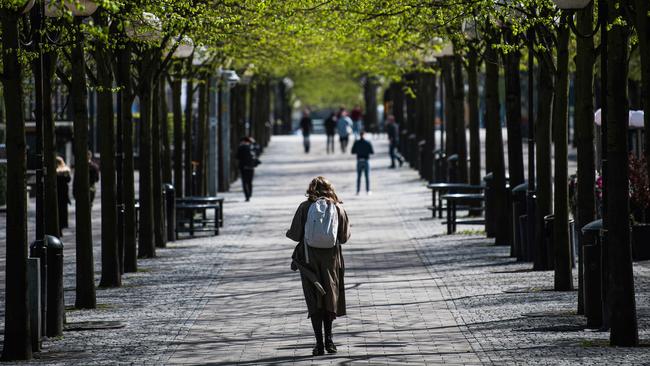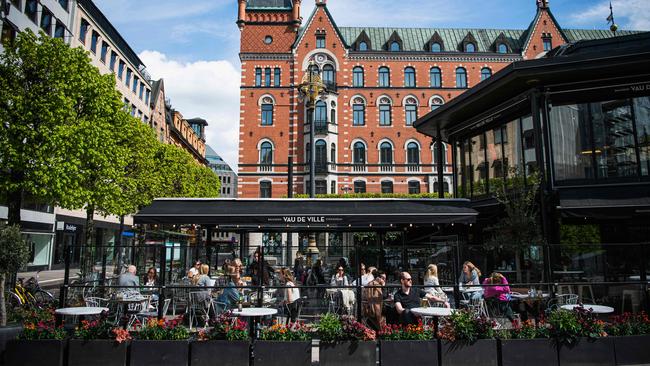Coronavirus: How I became part of Sweden’s herd immunity plan
An inside look at how Sweden’s bold plan to resist a strict, economy-killing lockdown played out.

The night before I left Iran, at the height of the coronavirus crisis there two months ago, I was at a party and one of my friends started to cough.
It was about midnight, Persian music was playing and the curtains were drawn against curious neighbours.
Then my friend became ill and the mood evaporated in a second. Everyone stopped dancing and he went to bed, skin clammy and hot.
While his girlfriend looked after him, the rest of us sat on a sofa, clinked our glasses and carried on. What else could we do? There was no point in distancing. We had already been together for hours.
When I got on a flight to Moscow the next day, en route to Sweden, I wore a mask and stayed as far from my fellow passengers as possible. Though I had no symptoms, I assumed that, like my friend, I had caught the coronavirus.
I was wrong, but two months on I have finally succumbed. Thanks to a socially distanced punk gig - a lapse in my otherwise rigorous social distancing effort - I have become part of Sweden’s move towards herd immunity.
I went to Iran to cover its parliamentary election but found myself trapped there when the virus erupted on the weekend of the vote. Turkey closed its border because of the pestilence next door, and I was unable to go home to Istanbul.
At the time, the disease had centred on China and I did not know anyone who had had it in Europe. In Tehran, however, the fear was everywhere: no one knew how many people had died; even those sympathetic to the regime mistrusted the official statistics.
After more than a week’s delay, I took the only flight I could get - via Russia - to my parents’ home here in Sweden. When I arrived I went into isolation in a cabin, expecting the symptoms of the coronavirus to turn up.
In Tehran, my friend got worse, then got better. Yet he had given the virus to his girlfriend, who lost her sense of smell - unable to taste even pungent saffron tea. Feeling fine, I allowed myself to think I was one of those people who catch it but are asymptomatic - a corona-bashing ubermensch.

It would take another six weeks, and a night out in Malmo, before I found out how boringly normal I was. That is when I joined the herd, and became part of the great Swedish coronavirus experiment.
While Europe went into lockdown, Sweden took a different approach. Bars and restaurants stayed open, with some restrictions: drinks can be served only at a table and gatherings of more than 50 people are banned.
By protecting the vulnerable while allowing the virus to spread as slowly as possible through the healthy population, the authorities hope herd immunity will build across the country.
Big mistakes have been made in the implementation of this policy. So far 3000 people have died, about half of them vulnerable older people. Yet the advice here remains the same: stay at home if you are feeling sick. If not, you are free to go out.
In an attempt to stop the economy from collapsing, nightlife is allowed to continue at a reduced rate.
On a Friday night two weeks ago, I went to a venue called Plan B in Malmo to do a story about a punk gig where everyone had to stand 6ft apart. It was not difficult to find volunteers to go with me. Despite the lack of restrictions, people have been going out less than usual, and the prospect of a night out sent friends into a frenzy. One even drove over from locked-down Denmark.
I danced about as much as I could in the 3ft square allotted to me, and my friends kept the beers coming our way. The place was heaving with students. I befriended a blonde girl who told me, with incredible earnestness, that she had not seen a real grown-up for weeks.
As I sat in Plan B’s packed beer garden, I sent pictures to party-starved friends in the UK, feeling pretty pleased with myself.
The next day, I felt nothing worse than a headache. The trouble began the textbook five days later, when I noticed a slight tickling in my throat while having a sundowner with my parents. Even though it was early evening, I was strangely tired and started nodding off. I put it down to the fact that my dad - who was sitting at a distance - was telling me an in-depth story about a new type of solar-powered bilge pump he claimed to have invented in lockdown.
I went back to my cabin. By the next day, my symptoms almost exactly matched the WHO list of symptoms: fever, cough, lethargy. I had lost my sense of taste and smell - which, given Swedish cuisine, was no great loss. Though I felt tired, I clearly had a mild strain of the virus.
From my sick bed I called Anders Tegnell, the state epidemiologist, with the news that I was joining his great experiment in herd immunity.
“What’s done so far in our modelling, all of it agrees that 20 per cent-25 per cent of the population in Stockholm and the surrounding area have had it,” he said.
“I think you need to realise that immunity in the population is not an on and off thing: herd immunity is not something you achieve and the disease stops. It’s a process. The more people become immune, the slower the spread of the virus in a population.”
Well, I am happy to help if I can. Now it has been almost two weeks since I caught the virus, and it is not too bad. I have been tired and it really is odd not being able to taste things (even pickled herring).
If I get out of bed to go to the kitchen, I have to sit down for a while and rest. It is not unlike being extraordinarily hungover. I have developed a new appreciation for crisps and have become an authority on which foods have the worst texture (kidney beans - mealy and revolting).
Yet some useful things have come out of joining the herd. I have been using my lack of taste buds to cover everything in the hottest hot sauce I can find, with a view, when this is all over, to being able to eat the rendang curry at the Indonesian place near my house in Istanbul without wimping out halfway through. And at least I might now have antibodies, helping build immunity to slow the spread of the disease.
It turns out, of course, that my brother - who I am living with - is the one with the ubermensch genes. Despite spending just as much time in the Plan B beer garden as I did, he has been just fine.
The Times






